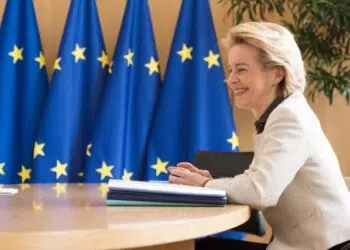Brussels – She had announced it in September at the State of the Union Address and then confirmed it in December at the first European Agri Food Days. The President of the European Commission, Ursula von der Leyen, will formally launch the Strategic Dialogue on the Future of Agriculture in the EU on Thursday, January 25, in the presence of some 30 supply chain organizations.
Commission sources explain to Eunews that Peter Strohschneider will lead the discussion, singled out for his “long and recognized professional experience,” notably as chairman of the German federal government’s ‘commission for the future of agriculture’ (Zukunftskommission Landwirtschaft, ZKL). The initiative, in which several farmers’ organizations will participate, including COPA, COGECA, and IFOAM Organics Europe, in the coming months will aim to “promote the creation of new solutions” and to achieve a “common vision” by the summer of 2024. After the inaugural meeting, there will be several thematic meetings in the first half of the year. The discussion among farmers, cooperatives, agricultural enterprises, nongovernmental organizations, and representatives of civil society will serve to focus on challenges and opportunities for the supply chain, such as income for farmers and rural communities, supporting agriculture “within the confines of our planet” and its ecosystems, harnessing the enormous opportunities offered by knowledge and technological innovation, and promoting a prosperous future for the EU food system in a competitive world. “The entire food system also faces several serious challenges, such as climate change and a very competitive global market, with a huge impact on the entire sector, particularly on farmers and rural communities,” Commission sources say. The dialogue aims to find the right balance between food security goals and farmers’ incomes, not losing sight of green transition goals that must also involve the sector (since more than 10 percent of emissions come from there).
Since last fall, the European Commission has launched a new phase of the Green Deal, more attentive to the realities of industry and farmers, who in recent months have voiced their dissatisfaction with some of the key pillars of Europe’s green growth strategy. And their dissatisfaction soon became a political banner of the European People’s Party (EPP) – von der Leyen’s own political family – ahead of the upcoming June elections. The group, and the European center-right in general, first targeted the proposed Nature Restoration Act, which it accused of threatening agricultural production and, therefore, food security at the current sensitive time of Russia’s war in Ukraine. And then, it helped bury the proposal to reduce pesticide use, which will now slip directly to the next legislature.
In addition to the legislative impasse on some of the key pillars of the Green Deal, the most obvious consequence is that, especially given the June 2024 elections, the European Commission has begun to talk and engage more directly with representatives of the agribusiness and industrial sectors. The first energy transition dialogues dedicated to hydrogen and the energy-intensive industry started in late 2023.
English version by the Translation Service of Withub






